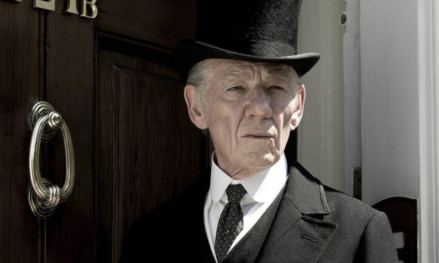
After more than 50 years at the top of his craft as an actor, Sir Ian McKellen has earned the right to do things a little differently.
After entering the room, taking off his trilby and taking a sip of his luminous green apple and mint soda cocktail, he begins our interview by asking me a question.
“Do you know the first person to play Sherlock Holmes on screen?”
I admit my knowledge of silent movies is not extensive but the name William Gillette looms large when it comes to early portrayals of the famous detective.
“Gillette was the first to play him on stage and we owe a lot of what we think of as Sherlock Holmes to his portrayal,” Sir Ian informs me.
“But the first to play him on screen was an anonymous actor, Hungarian I think.
“It was just a brief snippet, you can see it on YouTube, but no one knows his name.
“It’s ironic that the first actor to play Holmes is unknown, it’s a mystery. I like that.”
By McKellen’s estimation 129 actors have given us their version of Sir Arthur Conan Doyle’s creation since, making him the 130th. But in typical style, he’s doing it a little differently.
In Mr Holmes, the world-famous sleuth has retired to a remote Sussex farmhouse, living in relative anonymity with only his housekeeper Mrs Munro (Laura Linney) and her young son Roger for company.
Showing the symptoms of dementia, Sherlock cuts a frustrated figure, aggravated by the misrepresentation of him in
Dr Watson’s best-selling novels, and annoyed that the case which had led to his retirement 30 years before remains unsolved.
The film is based on a 2005 book, A Slight Trick Of The Mind, by US author Mitch Cullin.
It has been criticised by some Sherlockians the name given to Holmes’ most ardent enthusiasts for playing around with the legend.
But Sir Ian says he hasn’t heard of any complaints, and not just because he admits to being a little hard of hearing these days.
“It’s another play on a familiar character and I think it’s possible to sit through the film and believe Conan Doyle had written it which of course he hasn’t,” says the 76-year-old, who can also be seen currently in ITV comedy Vicious (Mondays, 9pm).
“It’s not as difficult to play a character that so many other people have played as you might think.
“When I played Hamlet, if you started to think about all the people who had played Hamlet you’d never step out on to the stage.
“But you do because you know that so many of those people have had a success, it’s a wonderful part, so don’t deny yourself that.
“And that’s true of Macbeth, Romeo & Juliet, the ugly sisters and King Lear.
“The difference with this as compared with Hamlet is that my Holmes is a script nobody else has done before. The character is Conan Doyle’s but it owes much to Mitch Cullin’s imagination as well.”
As he approached the retirement age for most of us 11 years ago,
Sir Ian announced he still had three extremely varied ambitions left in his profession to play King Lear, appear in Coronation Street and take on the role of Widow Twankey in pantomime.
He has since managed all three so I wondered if playing Holmes was a new ambition on his bucket list?
“No, I’ve never had an ambition to play Holmes,” he responds.
“And if I had any thought about playing him I would have thought I was too old. Then this part of a 93-year-old Sherlock Holmes comes along.
“At my age, I’m inevitably interested in what it’s like to be an old man, surviving your friends, and trying to understand a sometimes alien world.
“I don’t worry on my own behalf about decline, because it’s not really happened yet, but I do with friends.
“I see what happens, and mortality’s ever-present, of course. It’s no fun seeing an elderly relative decline and change.
“I found it quite touching that, as Holmes nears his end, he wants to complete the emotional side of his life that has been neglected.
“It was a reminder that even right at the end there’s more you can discover about yourself.
“Don’t give up, that’s a good motto for an old person to have. If Sherlock Holmes can become a more pleasant, sociable person, there’s hope for us all.”
Mr Holmes is in cinemas from Friday.

Enjoy the convenience of having The Sunday Post delivered as a digital ePaper straight to your smartphone, tablet or computer.
Subscribe for only £5.49 a month and enjoy all the benefits of the printed paper as a digital replica.
Subscribe